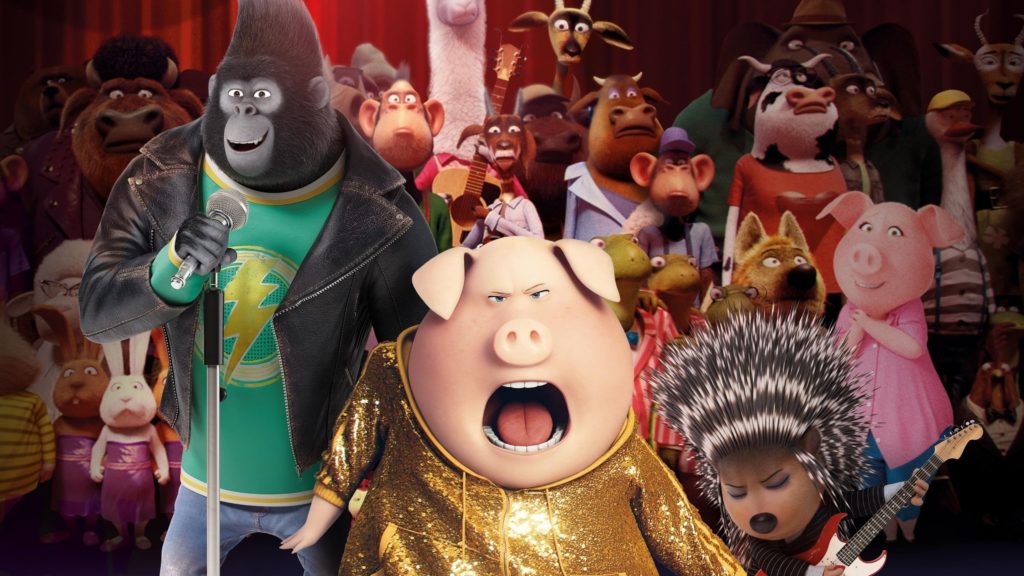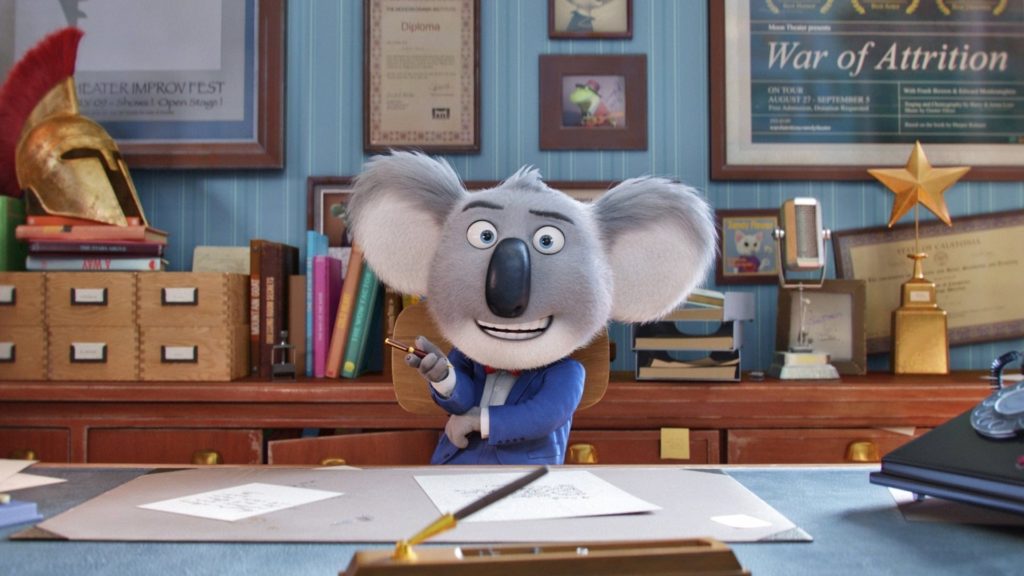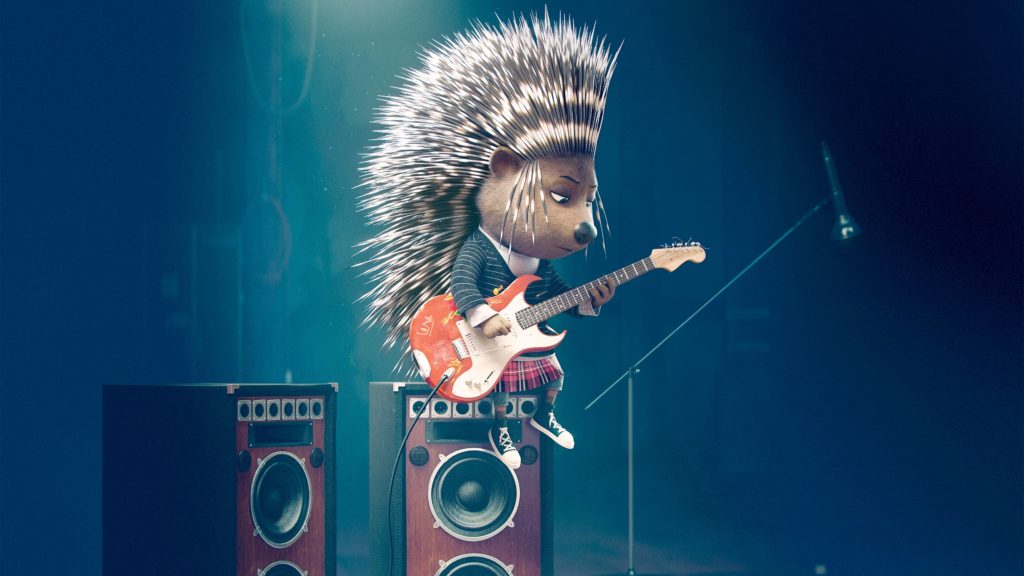Zootopia Idol
I know that it is impossible to make a mainstream studio animated movie in 9 months. We can be certain from press releases that Sing began production no later than 2014, and probably began preproduction before that. But it still feels like Sing is Illumination’s response to Disney making a billion dollars from Zootopia in March and rushing a knockoff to market in December. The same basic setting is there: a multi-species animal city that’s a metaphor for multiculturalism (in this case, a much more vague metaphor than the heavily allegorical Zootopia). The animals here are the same sorta-but-not-entirely anthropomorphic designs used in Disney’s hit, with the same spectrum of sizes played for comic and (less so) dramatic effect. Sing even cribs that idea that organized crime is a big part of everyday animal life, even though there’s not really any inherent reason to highlight this except that Zootopia did.
(Fun fact: Zootopia is the highest-grossing original film of all time not directed by James Cameron.)
But mostly what makes Sing feel like a cheap knockoff is that it’s a real mess: A scattershot of half-formed ideas with a lot of gaping voids where things like “story” and “character development” should go. It is, after all, an Illumination joint. That should tell you what you need to know: It’s going to be chipper and cartoonish enough to keep the little ones engaged, but offer little material of enrichment for anyone looking for something in cinema beyond “fat pig does silly dance to pop song.”

The movie follows Buster Moon (Matthew McConaughey), a koala who owns an unsuccessful theater and hoping to get his next show off the ground. The movie hand-waves any sort of character exposition that might have led us to care whether Moon succeeds or fails — though, oddly, the second half of the script acts like we should be invested in Moon’s relationship with his deceased father, a thread that has been entirely edited out of the first half of the movie minus a small number of quick mentions. I was wondering if I had suffered some sort of short-term brain damage when Moon started crying because he was disappointing a dad we knew nothing about.
Moon is on his last financial legs, and he needs a successful act to keep his theater afloat. He comes up with the idea of an American Idol-esque singing competition, but set on his stage. A typo inflating the prize gets added to the fliers, and the result is a huge turnout. After a tryout montage, the finalists include a soulful gorilla (not racist) (Taron Egerton), a housewife pig (Reese Witherspoon) and her flamboyant dance partner (Nick Kroll), a shy elephant (Tori Kelly), a Rat Pack mouse (Seth Macfarlane), K-pop singing caricatured red pandas (not racist), a rock-singing teen porcupine (Scarlett Johansson), and maybe one or two others; it’s not really worth remembering them all in detail.

What keeps the movie interesting, though not good, is that it gets weirdly intense for spurts at a time. Like a scene or plot thread will lean in on some wacky idea or gimmick. The opening, for example, crafts the entire introduction of the ensemble as a single extended shot flying around town. Cool idea! Doesn’t really mean much, but it’s something, right?
Another memorable bit of more substance is when the theater gets damaged by a flood. But it’s not just any flood, it’s a mythically huge flood shot like a disaster film; Sing becomes Titanic for a scene. Why they threw this into a movie about hedgehogs dancing to Carly Rae Jepsen, I’m not sure, but it’s weird and fun.
That’s the problem with this movie: It feels like little, incompatible units of movie haphazardly piled on top of each other. Even when it works, it doesn’t really have any context for it to stick. Consider, also, Rosita, the housewife pig: She gets an intensely bleak and bizarre introduction where she needs to automate herself out of motherhood with a Rube Goldberg machine so she can pursue her dream with her family unfazed, presented as an entirely straight-faced high-jink, not a piece of black satire. It really could have been great; here it’s just bizarre and mildly amusing.

By the end of the movie, the stakes make absolutely no sense. The characters have barely grown — the big “dark night of the soul” part of the story is so slight, it’s almost funny: The characters just shrug their way to the decision to put on a show anyways at the moment we’d expect some sort of illuminating breakthrough and/or second guessing.
It almost goes without saying given the premise, but the music itself is one of the key elements of the film: Per IMDb, over 60 pop songs are included, including needle drops, covers, and a couple originals. It makes sense, honestly: That’s the whole pitch of the movie. Egerton as Johnny the Gorilla fares best among the singers; he’s got real chops, but also doesn’t overdo it. His performances match his character and feel the most like an actual revelation. Kelly’s take on Meena the shy elephant is impressive, but horribly over-sung like… well, a real singing contest show. And the actors you know as actors (Witherspoon, Johansson, etc.) are just fine; really only Macfarlane stands out as a knockoff Sinatra with some goofy flair in his “My Way” rendition.

The animation itself is adequate. The character designs are fine, but do very little with the animal nature of the characters. (You could make this movie starring humans and have to change only a couple of lines and scenes.) But, like the rest of the movie, the visuals just barely get by: solid rendering, bright colors, but very perfunctory direction and effects (minus some of the aforementioned bits of intensity, like the flood).
Illumination remains a box office juggernaut, but they have a long way to go before their movies are worth recommending outside of disposable entertainment for kids.
Is It Good?
Not Very Good (3/8)
Dan is the founder and head critic of The Goods. Follow Dan on Letterboxd. Join the Discord for updates and discussion.

